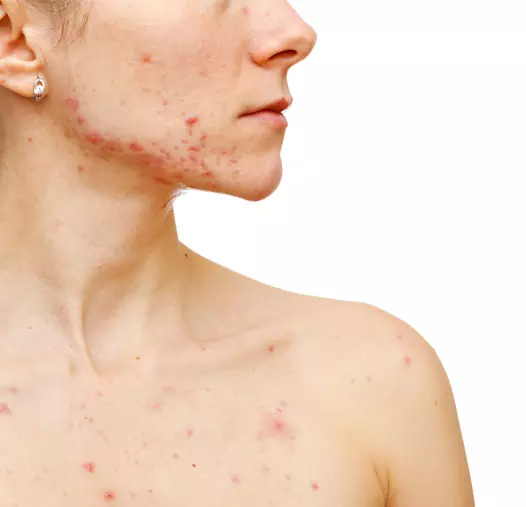Expert Dermatological Care for Skin Infections
Relief starts here—personalized treatment for fungal, bacterial, and viral skin infections.
Comprehensive Treatment for Skin Infections
Skin infections are common, treatable, and can infect people from all walks of life. Whether caused by fungi, bacteria, or viruses, these infections can become uncomfortable, unsightly, and even serious if left untreated.
Prompt diagnosis and treatment by a board-certified dermatologist can prevent complications and help your skin get back on track and heal faster. At Clarus Dermatology, we provide targeted treatment plans for all types of skin infections with your comfort and recovery in mind.
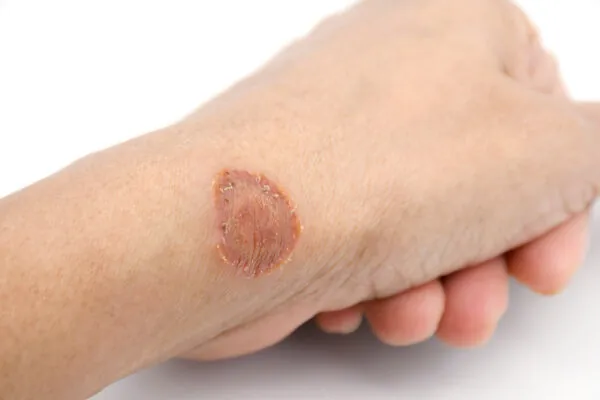 Common Types of Skin Infections & Symptoms
Common Types of Skin Infections & Symptoms
Skin infections can result from various sources, each presenting with distinct symptoms and requiring a tailored treatment approach. We often treat:
Fungal Skin Infections
Fungal infections thrive in warm, moist environments and often affect areas like the feet, groin, and skin folds. They can spread through direct contact or contaminated surfaces.
- Ringworm (Tinea Corporis): Red, circular rash with a raised, scaly edge.
- Athlete’s foot (Tinea Pedis): Itchy, cracked skin between the toes.
- Jock itch (Tinea Cruris): Red, irritated rash in the groin area.
- Nail fungus (Onychomycosis): Thickened, discolored nails.
- Yeast infections (Candidiasis): Red, itchy patches in warm, moist areas of the body.
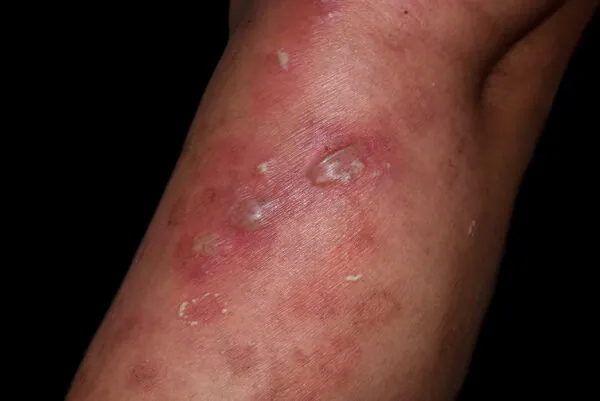 Bacterial Skin Infections
Bacterial Skin Infections
Bacterial infections can develop quickly, often entering the body through breaks in the skin. They can range from mild to severe and, in some cases, may require urgent medical attention.
- Impetigo: Contagious sores with honey-colored crusts, common in children.
- Cellulitis: Painful, red swelling of the skin, often spreading rapidly.
- Folliculitis: Infected hair follicles causing red, pus-filled bumps.
- MRSA (Methicillin-Resistant Staphylococcus Aureus): Antibiotic-resistant bacterial infection leading to painful skin abscesses.
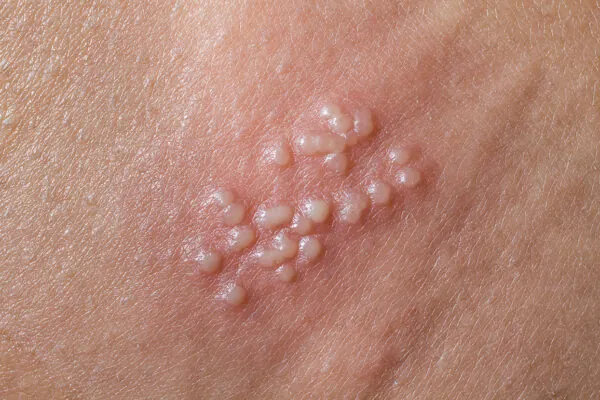 Viral Skin Infections
Viral Skin Infections
Viral infections are caused by viruses that affect the skin’s outer layers, often leading to blisters or bumps. Some are highly contagious and may recur.
- Warts (Human Papillomavirus – HPV): Rough skin growths, often on hands or feet.
- Herpes simplex virus (HSV-1 & HSV-2): Painful blisters around the mouth (cold sores) or genitals.
- Molluscum contagiosum: Small, flesh-colored bumps that spread easily.
- Shingles (Herpes Zoster): Painful, blistering rash caused by the reactivation of chickenpox.
Accurate diagnosis is the first step toward effective treatment. At Clarus Dermatology, we use multiple methods to pinpoint the cause of your skin infection, starting with a physical examination of the appearance, location, and pattern of the infection.
We use skin cultures and swabs to identify the exact pathogen. For deeper or unclear infections, we may take a small biopsy to analyze. If there are signs of a systemic infection or recurring skin issues, we may also order blood tests.
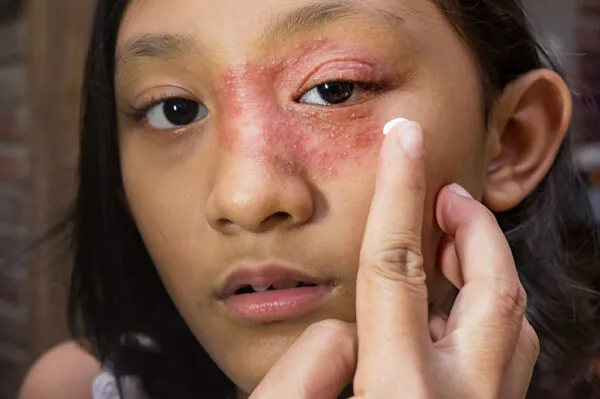 Treatment Options for Skin Infections
Treatment Options for Skin Infections
Treatment depends on the underlying cause of the infection and its severity. Our experienced dermatology team will select the best targeted solution for your needs.
Fungal Infection Treatments
Fungal infections are usually managed with antifungal medications, which can be applied topically or taken orally, depending on the severity. Treatments may include:
- Topical antifungal creams & ointments, such as clotrimazole and terbinafine
- Oral antifungal medications, such as fluconazole or itraconazole
- Lifestyle adjustments, including keeping skin dry and avoiding contaminated surfaces
Bacterial Infection Treatments
Bacterial infections often respond well to antibiotic therapy. Treatment may be topical or systemic, and some cases require minor in-office procedures.
- Topical antibiotics, such as mupirocin for mild bacterial infections like impetigo
- Oral antibiotics, such as cephalexin or doxycycline, which are commonly prescribed for cellulitis or more widespread infections
- Drainage procedures, often used for abscesses or boils to speed healing
 Viral Infection Treatments
Viral Infection Treatments
While some viral infections resolve on their own, others may benefit from antiviral therapy or procedures to minimize discomfort and prevent recurrence.
- Antiviral medications, such as acyclovir or valacyclovir, which can help reduce symptoms and shorten outbreaks of herpes and shingles
- Cryotherapy or laser treatment, which are often used to remove warts
- Topical treatments, often used for molluscum contagiosum and other mild viral skin infections
When to See a Dermatologist
While some skin infections may resolve on their own, many require professional care. It’s always best to seek dermatological help if you experience:
- A persistent rash or skin irritation that doesn’t improve with OTC products
- Painful, swollen, or rapidly spreading skin lesions
- Pus, drainage, or signs of systemic infection such as fever or fatigue
- Frequent skin infections or recurrent outbreaks
Prevention Tips & Skin Health Recommendations
Preventing skin infections starts with consistent self-care and smart daily habits. With mindful choices, you can substantially reduce your risk of future outbreaks and support your skin’s overall health. These include:
- Wash your hands regularly with soap and water to reduce the spread of bacteria and viruses.
- Avoid sharing personal items, such as razors, towels, or socks, which can harbor infectious microbes.
- Keep your skin well-moisturized to prevent cracks and dryness that can become entry points for bacteria.
- Wear breathable, moisture-wicking fabrics to help reduce excess moisture, especially in warm areas of the body.
- Support your immune system through a balanced diet, regular exercise, and adequate sleep.
- Talk to your doctor about staying up to date on vaccinations, including the shingles vaccine, which can help prevent certain viral infections.
Frequently Asked Questions
Each type of infection presents with distinct signs. A dermatologist can evaluate your symptoms and perform tests to determine what type of skin infection you’re dealing with.
While some minor skin infections may resolve on their own with OTC treatments, many require medical care to fully clear and avoid complications. If your skin infection isn’t going away, it’s best to contact a dermatologist.
Yes, many are. Fungal, bacterial, and viral skin infections can spread through skin-to-skin contact or shared items.
Topical antifungals are typically effective. In stubborn cases, oral antifungal medications can be an effective alternative. These medications are prescribed.
Good hygiene, skin care, and proper treatment of initial infections reduce your risk of recurrence. If you’ve dealt with persistent skin infections in the past, a proactive approach is a must to protect your skin’s health.
Get Expert Treatment for Skin Infections Today
Skin infections can escalate quickly without proper attention. If you’re dealing with a persistent or worsening condition, a dermatologist can help you find relief and prevent complications. Our experienced team at Clarus Dermatology is here to support you with evidence-based treatment and clear guidance every step of the way.
Schedule Your Consultation